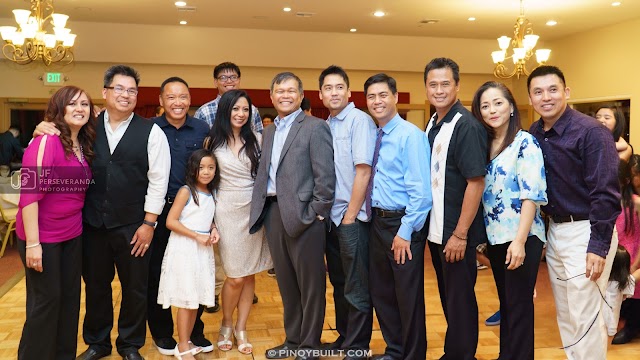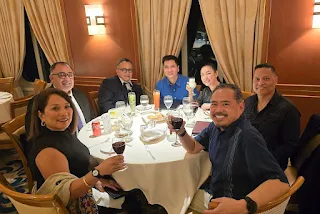Whether you're a first-generation immigrant who journeyed here from the Philippines, a second-generation Filipino-American born and raised in the U.S., or like me—a 1.5-generation Filipino—you belong here.
Published on
How Trump and Republicans Are Redrawing America’s Political Maps — And Why It Matters
In the United States, every 10 years after the Census, congressional and legislative district lines are redrawn. This process—known as redistricting—is meant to ensure that political representation reflects population changes. But more often than not, redistricting turns into gerrymandering, where the party in power manipulates maps to lock in political advantage.
This week, CNN reported that Texas Republicans now have a clear path to redraw congressional maps, thanks to Trump’s continued influence and pressure on GOP lawmakers. On the other side of the country, California Democrats are preparing to redraw their own maps in response, escalating what some call a “redistricting arms race” between the nation’s two largest states.
This isn’t just about Texas and California—it’s about the future of American democracy itself.
Texas: Trump’s Map and the GOP Strategy
Texas Republicans are rushing to pass new maps that would create five additional GOP-leaning seats in the U.S. House of Representatives. This move, strongly backed by Trump, highlights how Republicans are leveraging their control of state legislatures to entrench power.
- Trump’s role: Trump personally urged Texas Republicans on Truth Social, writing, “Please pass this Map, ASAP. THANK YOU TEXAS — MAKE AMERICA GREAT AGAIN!”
- Locked doors and arrests: To prevent Democratic lawmakers from fleeing again, Texas House Speaker Dustin Burrows literally ordered the doors of the House chamber locked and threatened Democrats with law enforcement escorts.
- Democratic resistance: Democrats previously walked out for 15 days to delay passage, but now admit their options are nearly exhausted.
At the core, the GOP strategy is simple: control the lines, control the seats, control Congress.
California: Fighting Fire with Fire
Meanwhile, in California, Democrats are pushing their own counter-maps that could net them five new Democratic seats—essentially matching the GOP’s Texas effort. State leaders argue that if Republicans are going to redraw maps in Texas and Florida, Democrats cannot “sit on the sidelines.”
- Democratic framing: California leaders say this is a defense against Trump’s authoritarian tactics. Senator Mike McGuire said bluntly: “The only reason we are here is because of President Trump and American Republicans and their leadership.”
- Republican pushback: California Republicans denounced the move as “Gavinmandering,” accusing Governor Newsom and Democrats of abandoning their principles by imitating GOP tactics.
- Next steps: The California proposal would require a constitutional amendment, passing with two-thirds majorities in both chambers before going to voters in November.
Both sides are effectively admitting that redistricting is no longer a neutral process—it’s a weapon.
Historical Context: Gerrymandering in America
Gerrymandering is not new. The term comes from 1812, when Massachusetts Governor Elbridge Gerry approved a district map so distorted that one district resembled a salamander. Two centuries later, the stakes are higher: modern data, computer modeling, and partisan polarization allow for unprecedented precision in choosing voters rather than voters choosing their representatives.
Historically:
- Republicans have been more aggressive in using gerrymandering since the 2010 Tea Party wave, gaining long-term advantages in states like Wisconsin, North Carolina, and Ohio.
- Democrats have also engaged in partisan mapmaking, especially in states like Illinois, Maryland, and now California.
- Nonpartisan commissions (like in Arizona and Michigan) have tried to limit gerrymandering, but their power varies from state to state.
Today’s Texas–California battle marks a new chapter: an open, tit-for-tat redistricting war where both parties admit they’re fighting for survival.
Why This Matters: Democracy Under Siege
For Filipino Americans in places like Texas, California, and across the U.S., this struggle hits home. Our community—often concentrated in military towns, suburbs, and immigrant-heavy districts—can easily find its voice diluted by gerrymandered maps.
Here’s why the fight over maps matters to us:
- Representation: Gerrymandered maps can split Filipino communities into multiple districts, reducing our collective political power.
- Immigration and healthcare: Who controls Congress affects policies that impact immigrant families, from healthcare access to visa rules to support for frontline workers.
- Checks and balances: If one party locks in power through maps, elections become less meaningful, and accountability disappears.
As Rep. Pete Aguilar (D-CA) put it: “They are so scared to face real oversight and accountability that they’re rigging the system to stay in power.”
Marcos 1976 vs. Trump 2025: A Comparison
For many Filipino Americans, Trump’s push to rig political maps feels uncomfortably familiar. Under Ferdinand Marcos, the Philippines experienced its own manipulation of political rules to stay in power during Martial Law.
| Marcos 1976 | Trump 2025 |
|---|---|
| Declared Martial Law to extend rule beyond constitutional limits. | Pressuring state legislatures to redraw maps for permanent GOP advantage. |
| Used “barangay elections” and controlled assemblies to legitimize power. | Uses gerrymandered maps and partisan statehouses to manufacture congressional dominance. |
| Silenced dissent through arrests, exile, and curtailing opposition movements. | Encourages threats against dissenting lawmakers; uses police power to control legislators in Texas. |
| Portrayed his power grab as saving the nation from “chaos and communism.” | Frames redistricting as saving America from “Democrat fraud” and “chaos.” |
The lesson? When leaders rig the system to stay in power, democracy itself is at risk.
The Road Ahead: Can Reform Win?
So what can be done? Reformers across the U.S. are pushing for nonpartisan, independent redistricting commissions—similar to what California used in 2011 before this partisan arms race. Some Republicans, like California Assembly Leader James Gallagher, even support a national constitutional amendment requiring independent commissions nationwide.
But here’s the challenge: Why would politicians give up a weapon that ensures their survival?
- Court battles: Expect lawsuits over racial and partisan gerrymandering, especially in Texas, where past maps were struck down for diluting Latino and Black votes.
- Public pressure: Voters in states like Michigan and Colorado have already passed ballot initiatives to create independent commissions. More states could follow.
- Federal action: Bills like the Freedom to Vote Act attempted to curb gerrymandering, but stalled in Congress due to the filibuster.
The fight is far from over—but the longer partisan gerrymandering continues unchecked, the weaker democracy becomes.
Why Filipino Americans Should Care
Filipino Americans—whether in Houston, Los Angeles, Vallejo, San Diego, or beyond—have a stake in this fight. Our families came to the U.S. chasing opportunity, and many served in the U.S. Navy, healthcare, and other frontline professions. Political maps that silence immigrant voices make it harder for our community to advocate for education, veterans’ benefits, and fair immigration laws.
We must ask ourselves:
- Do we want a democracy where politicians choose voters, or where voters choose politicians?
- Do we want to repeat the mistakes of the Philippines under Marcos—or learn from them?
- Will we stay silent while power is rigged, or will we demand fairness?
The answer will shape not just the 2026 midterms, but the future of Filipino American generations in this country.
Final Thoughts
Redistricting battles in Texas and California are not just local fights—they are the frontline of America’s democratic struggle. Trump’s pressure on Republicans to pass maps that guarantee GOP dominance, and Democrats’ willingness to respond in kind, reveal a dangerous cycle: a democracy increasingly driven by manipulation instead of fair competition.
Filipino Americans know from history—our own Martial Law years under Marcos—that democracy is fragile. Once leaders normalize cheating to stay in power, it becomes harder to restore faith in elections. That’s why this fight matters to all of us.
The maps being drawn today will shape the voices heard in Washington for the next decade. If we care about justice, fairness, and the future of our community, then we must stay informed, speak up, and demand accountability—because democracy only survives if we defend it.
📢 Join the Pinoybuilt Community
At Pinoybuilt.com, we believe that sharing our stories, learning from history, and standing together strengthens the Filipino American voice. Leave a comment, share this post, and let’s keep building a community that refuses to stay silent in the face of injustice.
🌐 Follow Us
- Instagram: @pinoybuilt
- TikTok: @pinoybuilt
- Twitter/X: @pinoybuilt
Labels
trump, republicans, texas, california, redistricting, gerrymandering, democracy, cheating, congress, maps, marcos, martiallaw, authoritarianism, philippines, filipino, filipinoamerican, politics, elections, representation, learnfromhistory
Hashtags
#Pinoybuilt #FilipinoAmerican #TexasPolitics #CaliforniaPolitics #Redistricting #Gerrymandering #Trump #Marcos #Democracy #Elections #Representation #LearnFromHistory #FilipinoVoices #Politics #Community















0 Comments
Hi! Thank you for dropping by. Please leave us a comment.